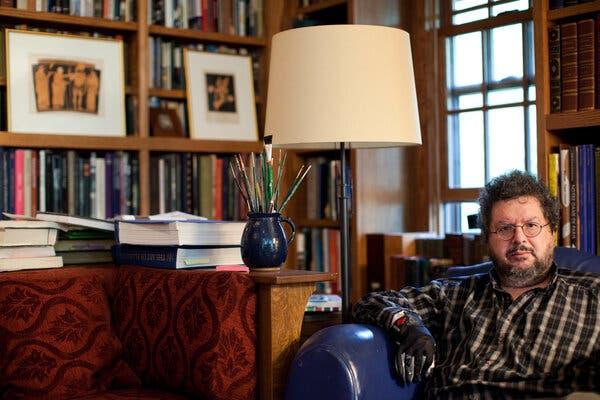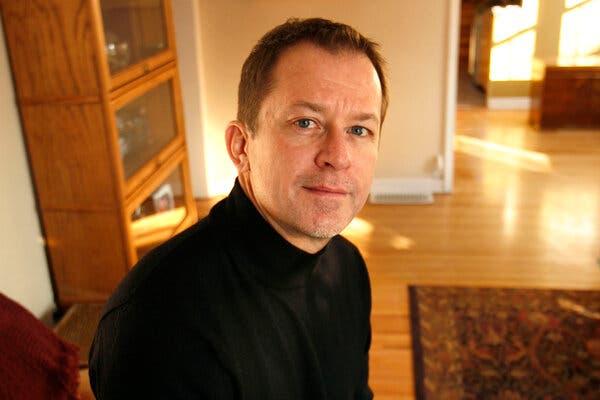Anna Betts
Unabomber Victims Reflect on Kaczynski’s Death
Years after a deadly bombing campaign said to be a warning about technology, survivors say they continue to think about Ted Kaczynski’s motivations.

When a package containing a bomb arrived for Patrick C. Fischer at his office at Vanderbilt University in 1982, sent by Theodore “Ted” Kaczynski, the so-called Unabomber, it put Mr. Fischer’s secretary in the hospital for three weeks with burns and lacerations. Mr. Fischer’s brother and sister-in-law, who are also computer scientists, wondered if they could be next.
Eleven years later, in 1993, a colleague who worked in the same computer science department as Mr. Fischer’s brother at Yale University, David Gelernter, became another one of Mr. Kaczynski’s victims. He was severely wounded and permanently lost the use of his right hand.
“We realized that this man was after computer people,” the sister-in-law, Alice Fischer, said on Monday. “He had attacked a store that sold computers, he had attacked at least two computer science people and we were both professionals in computer science.”
Mr. Kaczynski was arrested in 1996 after a nearly 20-year terror campaign in which he mailed bombs to academics, corporate executives and others in technology, killing three people and injuring 23 others.
The news over the weekend that Mr. Kaczynski had died by suicide at a federal prison medical center in North Carolina renewed terrifying memories for some victims and their families. It also prompted reflections on the degree to which the antipathy to technology that inspired Mr. Kaczynski’s deadly crusade continues to resonate more than a quarter century after his arrest.
A year before the arrest, Mr. Kaczynski tried to justify his actions by writing an anonymous 35,000-word manifesto, published jointly by The New York Times and The Washington Post. In the document, Mr. Kaczynski condemned industrialization and argued that technology was alienating people, damaging the environment and luring people into depending on it.
“It still has lessons for us today,” said Ms. Fischer. She includes a lesson on the Unabomber’s campaign in an ethics class she teaches each semester at the University of New Haven to her computer science students, many of whom, she said, are hoping to work with the Federal Bureau of Investigation and the Central Intelligence Agency. She said she regarded it as “very important history” for her students and a cautionary tale.
“Technology is a tool in its own right. It’s neither good nor bad,” she said. “If it falls into the hands of bad people, it’s bad.”

Her husband, Michael Fischer, whose brother was away from his office when the bomb arrived and died in 2011, said he has observed a growing skepticism about technology in today’s society that has some parallels with Mr. Kaczynski’s manifesto.
“In one sense, that was what was driving Kaczynski,” Mr. Fischer said. “What he wrote was that he was concerned about the possible downsides of technology and the world at large was not seeing those downsides. They were just seeing all the good things that come out of it.”
Mr. Fischer said the Unabomber nightmare largely came to an end for him and Alice when Mr. Kaczynski was arrested, but “the fact that he died in prison is a kind of final closure.”
Other victims and their relatives said they had spent decades trying to make sense of Mr. Kaczynski’s actions.
Jonathan Epstein, the son of Dr. Charles J. Epstein, a geneticist known for his research on Down syndrome and other genetic disorders who was injured when he received a bomb from Mr. Kaczynski in 1993, said that it was still not clear why his father was targeted.
It has been 12 years since Dr. Epstein died, and the news of Mr. Kaczynski’s death has reopened a chapter that he tried to put behind him.
Mr. Epstein said he never read the Unabomber manifesto in its entirety, but read summaries of its ideas.
If Mr. Kaczynski had published the manifesto today, Mr. Epstein said, it might seem relevant to current debates about the power of technology and artificial intelligence. But he has no doubt that “there would be no change in attitudes by the vast majority of the public in terms of the condemnation of his methods of using explosives.”

Gary Wright, who in 1987 was seriously injured by a bomb attributed to the Unabomber that was left in the parking lot of the computer repair shop he owned in Utah, has thought about Mr. Kaczynski’s warnings.
“I’m debating doing a TED Talk on that topic and debating the manifesto,” Mr. Wright said. “Because, throw away the murders, right? Throw away the meaning and everything else. It was the wrong method, but if you apply where we are today, it’s kind of prophetic in a way, that here we are today, we’re debating A.I., we’re debating all kinds of things. You got mental health issues due to social media.”
“He did see some elements early on that maybe others weren’t recognizing,” Mr. Wright added.
But this was not, he emphasized, “justifying anything.”
On his website, Mr. Wright lists the effects of the bombing: More than 200 pieces of shrapnel were removed from his body, and he underwent at least a dozen surgeries over a 15-year period to repair the damage.
Mr. Wright said he had been prepared for news of the death of the person who had tried to kill him for “quite a while,” having been “aware that he was sick.”
Mr. Wright said that he moved on with his life a long time ago.
“It took me a long time to get here, but it was about redefining forgiveness in a way that was acceptable to me,” Mr. Wright said. “I didn’t accept anything he did, but what I really did was look at it and say, ‘Look, I love myself enough that I’m not going to let others see me as less than what I could be or what I am.’”
Audio produced by Jack D’Isidoro.
Anna Betts is a reporter for the National desk and a member of the 2023–2024 New York Times Fellowship class. @annabettss
